Today, a reliable internet connection isn’t just a luxury but a necessity. Especially when travelling. Yet, many travellers find themselves frustrated with the limitations of hotel Wi-Fi networks, from slow speeds to connectivity issues. Fortunately, there are game-changing alternatives to hotel Wi-Fi: eSIM. Here, we’ll explore how eSIM is revolutionising connectivity for travellers and hotels alike.
TL;DR
- Hotel Wi-Fi is essential for travellers and guests, but can often be unreliable and frustratingly slow, leading to negative experiences for guests.
- eSIM is a small chip embedded within a device which allows users to switch between mobile networks seamlessly without physically swapping SIM cards.
- The benefits of eSIM include but aren’t limited to:
- Seamless connectivity worldwide
- Flexibility to switch between carriers
- Enhanced security features
- Enhanced guest satisfaction and positive reviews
- Access to valuable guest data for personalised services
The pitfalls of hotel Wi-Fi: a reality check
Hotel Wi-Fi has become an essential amenity for travellers, with many considering it a deciding factor when choosing a hotel for their stay. HighSpeedInternet found that 84% of respondents are less likely to book a hotel room if online reviews showed the accommodation had poor internet or no internet at all. However, despite that, it can often be unreliable and frustratingly slow, leading to negative experiences for guests. A report by TrustYou found that Wi-Fi is one of the key categories that continue to impact guest satisfaction.
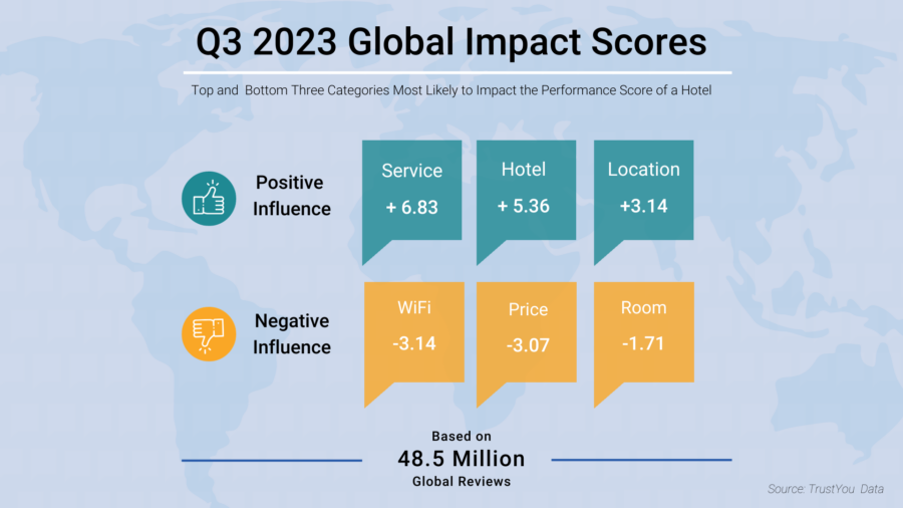
There are numerous reasons why hotel Wi-Fi can be problematic, these include:
- Slow speeds and unreliable connections – Hotel Wi-Fi often suffers from sluggish speeds and frequent disconnects, leading to frustration for guests trying to stay connected.
- Limited bandwidth – With multiple guests vying for bandwidth, hotel Wi-Fi can struggle to keep up with demand, resulting in delays and buffering.
- Security – Shared Wi-Fi networks in hotels pose security risks, leaving sensitive data vulnerable to hacking and unauthorised access. Forbes found that 40% of respondents had their information compromised while using public Wi-Fi. Hotel Wi-Fi networks especially are prone to cyber-attacks due to the large number of guests and transactions.
- Complex login procedures – Navigating login screens and password requirements can be a hassle for guests, wasting valuable time and causing more frustration than it’s worth. In turn, this results in negative reviews and decreased ratings.
- Guest complaints –Poor Wi-Fi experiences can tarnish a guest’s perception of a hotel and their satisfaction levels, leading to negative reviews and impacting future bookings.
Say hello to eSIM!
Thankfully, there’s an alternative to hotel Wi-Fi – eSIM. So what is an eSIM and how does it work? An eSIM, also known as an embedded SIM, is a small chip embedded within a device. Unlike plastic SIM cards, eSIM allows users to switch between mobile networks seamlessly without physically swapping SIM cards. Unlike traditional physical SIM cards that are removable, consumer eSIM is integrated into the device’s hardware and can’t be physically removed or swapped.
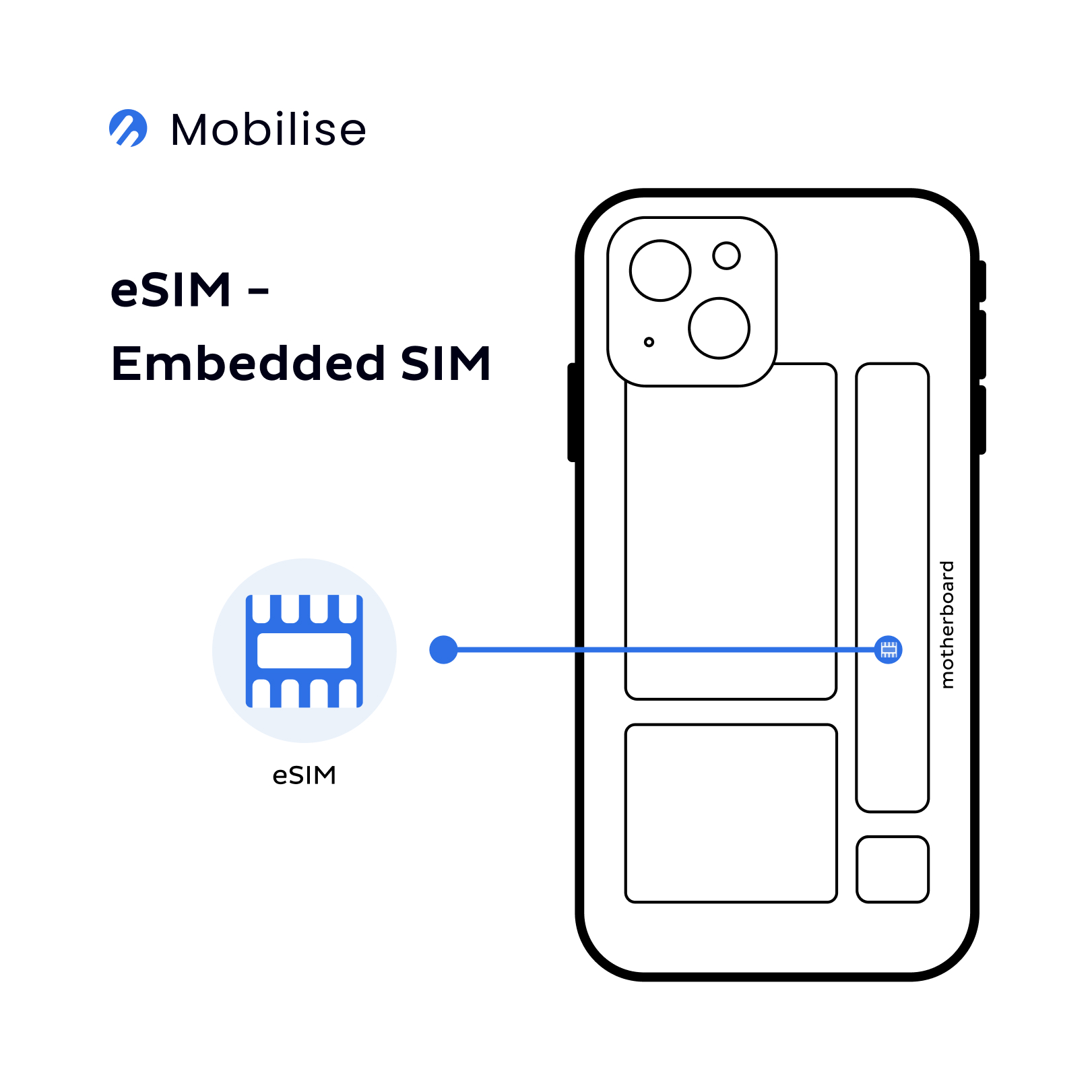
Statistics and predictions point towards a significant expansion of the eSIM market in the coming years. The eSIM market is predicted to expand significantly in the coming years, with a projected value of $20.6 billion by 2032, according to a report by Market.us Research.
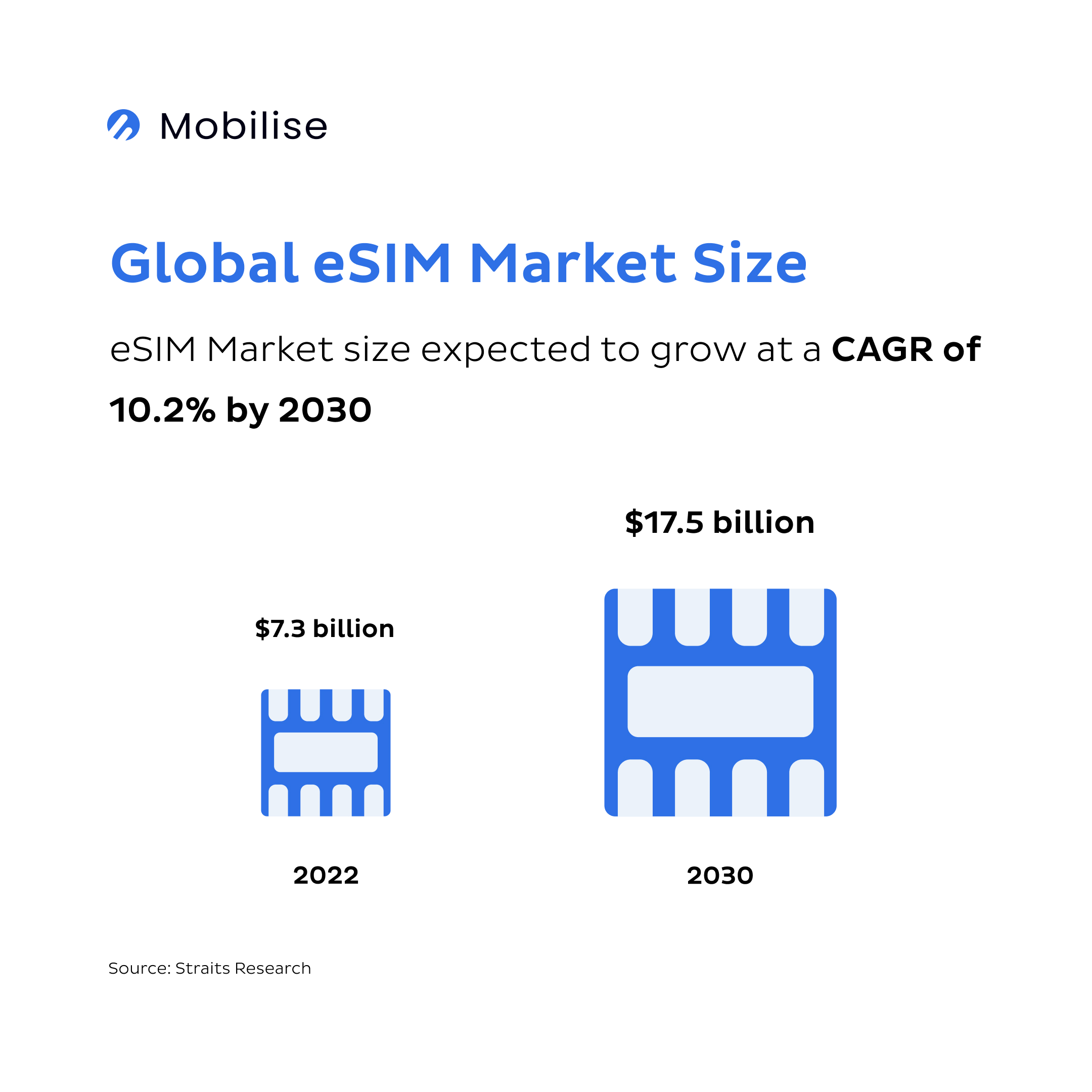
Not just that, eSIMs bring many advantages over traditional Wi-Fi. They offer seamless connectivity, global coverage, and high-speed internet access without the limitations of hotel Wi-Fi. Additionally, eSIMs offer many benefits over traditional Wi-Fi, including seamless connectivity, global coverage, and high-speed internet access that hotel Wi-Fi can’t compare to. This means that users can stay connected wherever they go, without having to worry about finding a Wi-Fi hotspot or dealing with slow internet speeds. Still not convinced? Check out our eSIM explained FAQ where we delve into more detail about eSIM!
eSIM as alternatives to hotel Wi-Fi
Seamless connectivity has become a necessity for guests on the go. With eSIM technology, guests no longer have to worry about manually switching SIM cards or relying on public Wi-Fi. eSIMs offer a reliable network in their destination country, ensuring a smooth and uninterrupted mobile experience throughout their journey, be it in the hotel or sightseeing nearby. Moreover, eSIM as a travel ancillary is becoming more widely adopted worldwide, enabling travel companies to provide seamless connectivity options to customers regardless of their destination. This means that geographical restrictions are no longer a hindrance in keeping guests connected. The seamless activation process and uninterrupted connectivity provide guests with a better overall mobile experience, enhancing their travel journey. This can keep them coming back for more, as according to Accenture, 26% of businesses that focus on “connectivity across all customer-facing functions” are more likely to achieve high levels of customer satisfaction. With high-speed internet available at their fingertips, guests can stay connected and engaged throughout their trip, making it a more enjoyable experience.
eSIM benefits for travellers
There are many benefits of eSIM for travellers, including:
- Seamless connectivity worldwide – Travellers can enjoy uninterrupted internet access across the globe. eSIM reduces the risk of unexpected roaming charges and offers a convenient solution for accessing mobile networks worldwide.
- No need for physical SIM cards – Simplify travel with multiple eSIM profiles stored on a device. Depending on the smartphone model, instead of the hassle of switching physical SIMs.
- Flexibility to switch between carriers – With eSIM, travellers aren’t tied to one carrier. Depending on their device manufacturer, the maximum number of eSIM profiles a user can store on their phone at one time ranges between 1 to 8.
- Enhanced security features – eSIM is more secure than traditional SIM cards. It removes the threat related to device theft or loss. In contrast to an embedded SIM, a physical SIM card can be easily discarded after the device has been stolen. eSIM makes the stolen device easier to find and harder to resell.
eSIM benefits for hotels
The benefits of eSIM for hotels include, but aren’t limited to:
- Streamlined guest connectivity process – Simplify guest access to high-speed internet without complex login procedures.
- Reduced maintenance costs – Cut down on Wi-Fi infrastructure maintenance with eSIM. Offering guests a more secure alternative to Wi-Fi through eSIMs is a great way to lower costs. The hard work is all carried out by the experts with your unique requirements in mind.
- Enhanced guest satisfaction and positive reviews – Improve guest experiences with reliable connectivity, leading to positive online reviews and repeat bookings. A hotel eSIM could play a pivotal role in enhancing customer experience by enabling seamless connectivity, personalised services, and even room access through digital keys. Offering guests a complete experience all from the comfort of their mobile device.
- Access to valuable guest data for personalised services – Collect guest data for personalised offerings and targeted marketing campaigns. Hotels can also send these tailored offers, discounts, and information directly to their guests’ devices through their apps.
How our eSIM solution works
Our Embedded Connectivity solution provides endless benefits to hotels looking to expand their revenue streams and improve customer experiences. It’s a “plug-and-play” solution that can be easily integrated into an existing app with no customisation required.
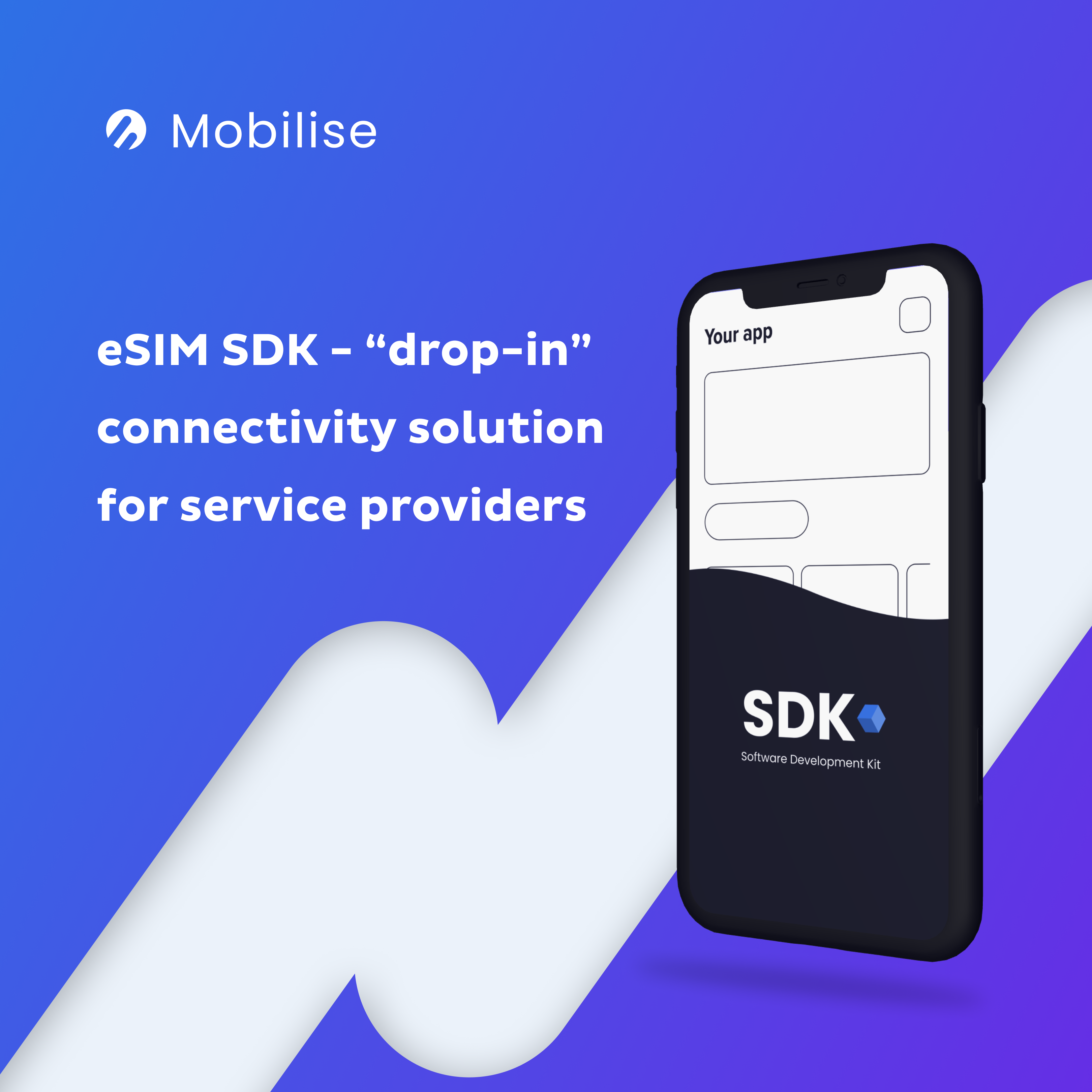
With low set-up fees and quick set-up, taking less than a week until final implementation, our eSIM SDK allows hotels to offer eSIM packages to their customers as an add-on. Featuring in-app eSIM activation in under 60 seconds without the hassle of QR codes or physical SIM swapping for hotel guests. But don’t just take our word for it. We’ve created an eSIM for hotels case study with an interactive prototype to show you how our eSIM SDK fits right into a hotel’s existing app!
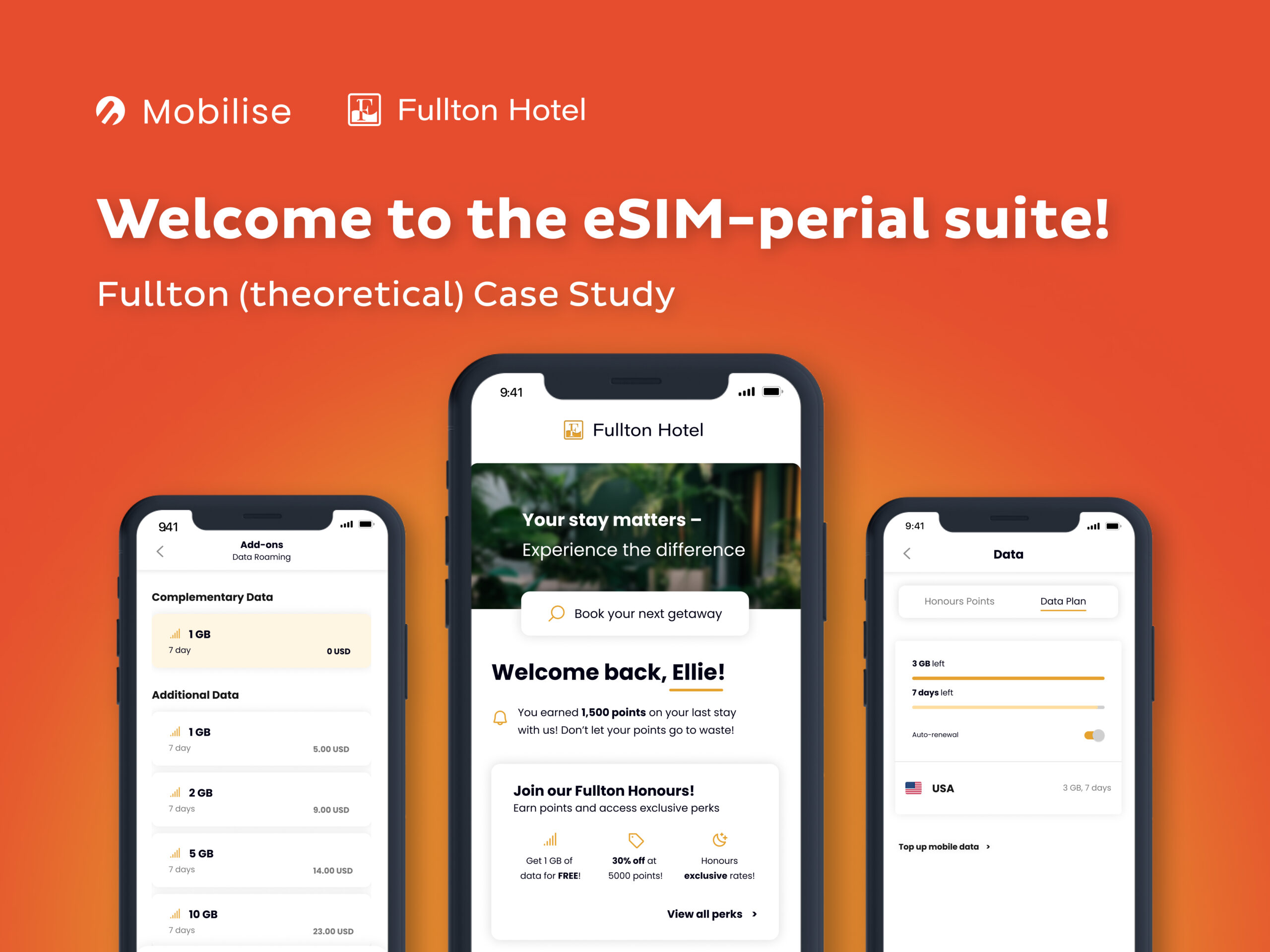
Future of connectivity: eSIMs leading the way
The role of eSIMs in Smart Hotel Technology
The hospitality industry is undergoing a technological revolution, and eSIMs are set to play a crucial role in shaping its future. By integrating eSIM-enabled devices and infrastructure, hotels can offer guests an unparalleled level of connectivity that surpasses the limitations of traditional Wi-Fi networks. From keyless entry systems that eliminate the need for physical keys to personalised in-room services, eSIMs enable hotels to leverage connectivity in innovative ways, enhancing the overall guest experience. With eSIMs, guests can enjoy seamless connectivity with faster data speeds, greater reliability, and improved security. The use of eSIMs in hotels is expected to set new standards for hospitality technology, providing guests with an immersive, connected experience that exceeds their expectations. As the hospitality industry continues to evolve, eSIMs will undoubtedly play a pivotal role in shaping the future of smart hotel technology.
Trends in the telecom industry favouring eSIM adoption
It’s no secret that staying connected while travelling is a top priority for many people. We found that 9 out of 10 travellers value mobile data connectivity while abroad. As a result, it’s not surprising that 38% of travellers are interested in purchasing an eSIM for travel from their hotel booking site or airline. To read more of our insights into Travel eSIMs, check out our travel eSIM infographic!
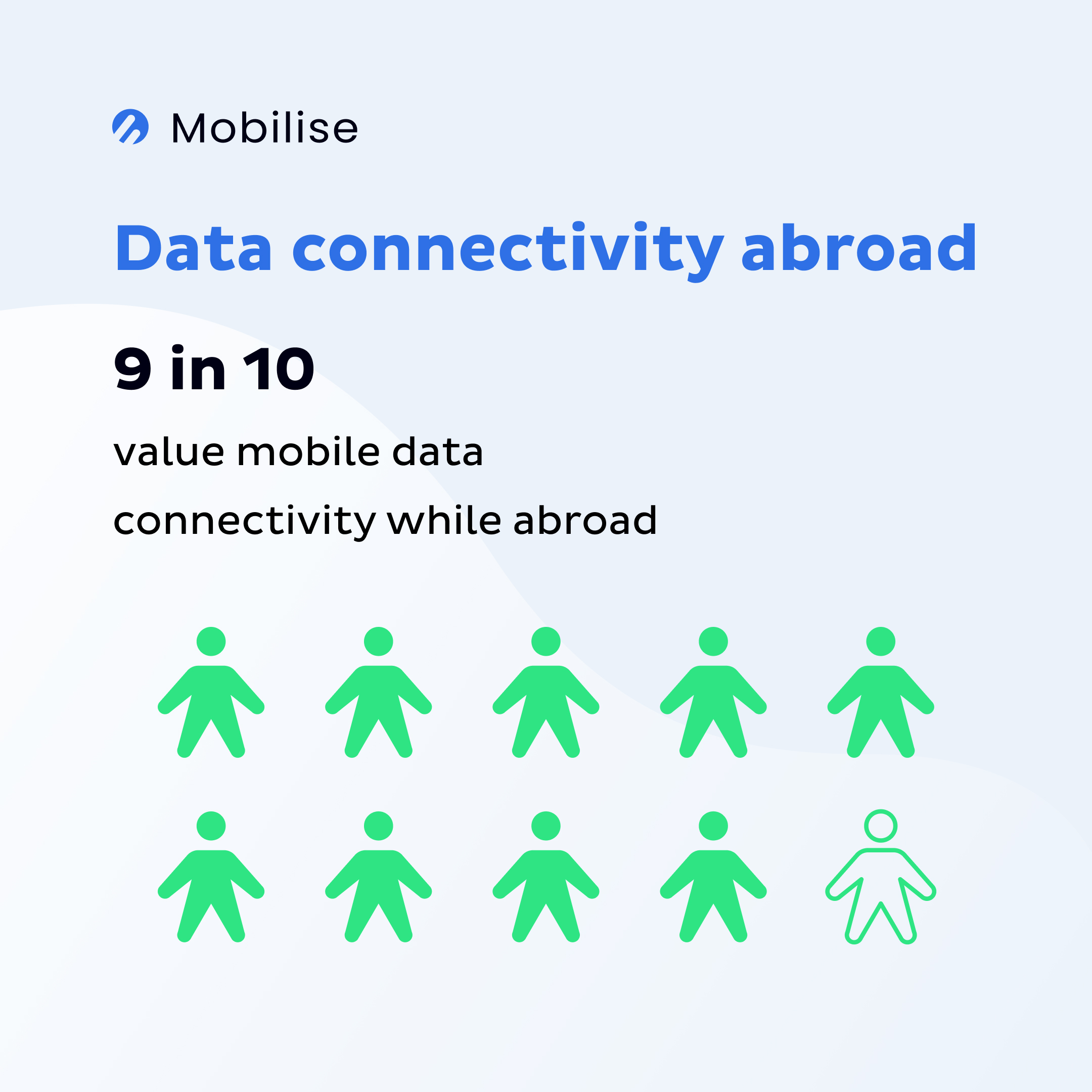
The telecom industry is witnessing a significant shift towards eSIM adoption, driven by several key trends. One trend is the increasing demand for IoT (Internet of Things) devices, which require eSIM for seamless connectivity. From smartwatches to connected cars, eSIMs are becoming the standard for enabling connectivity in a wide range of devices. Additionally, telecom operators are recognising the benefits of eSIMs in reducing operational costs and improving customer experience, leading to greater support and investment in eSIM infrastructure. eSIM is the way to go. Not only has the rate of eSIM adoption increased but so has the number of eSIM-capable smartphones. The number has increased by 88.7%, from 71 in 2022 to 134 in 2023.
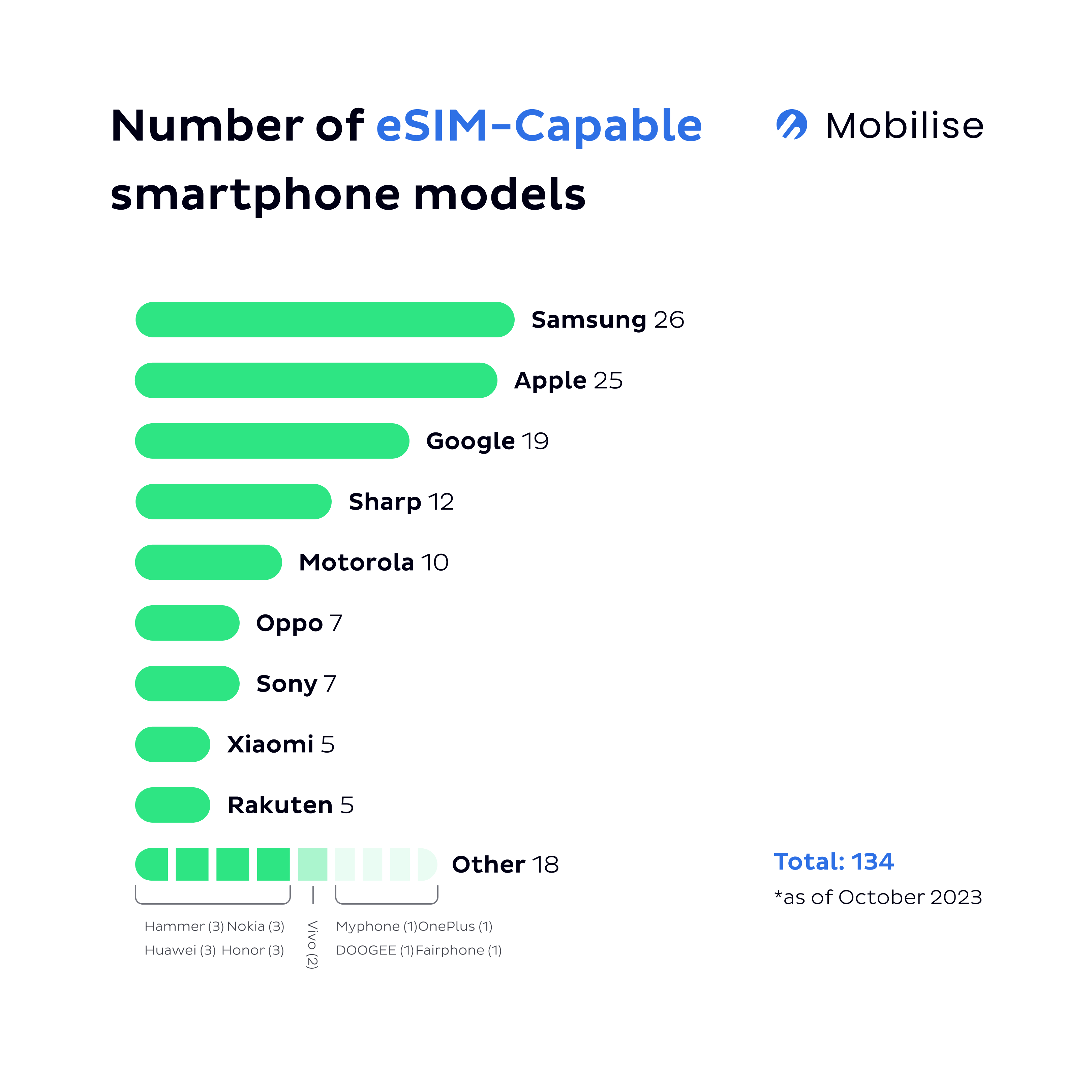
Anticipated developments in the eSIM landscape
The eSIM industry is set for further development and progress in the future. As eSIMs continue to evolve and mature, they are set to become the cornerstone of connectivity in the digital age, revolutionising how we stay connected and interact with the world around us. And the global eSIM market size is expected to grow at a CAGR of 10.2% and reach $17.5 billion by 2030.
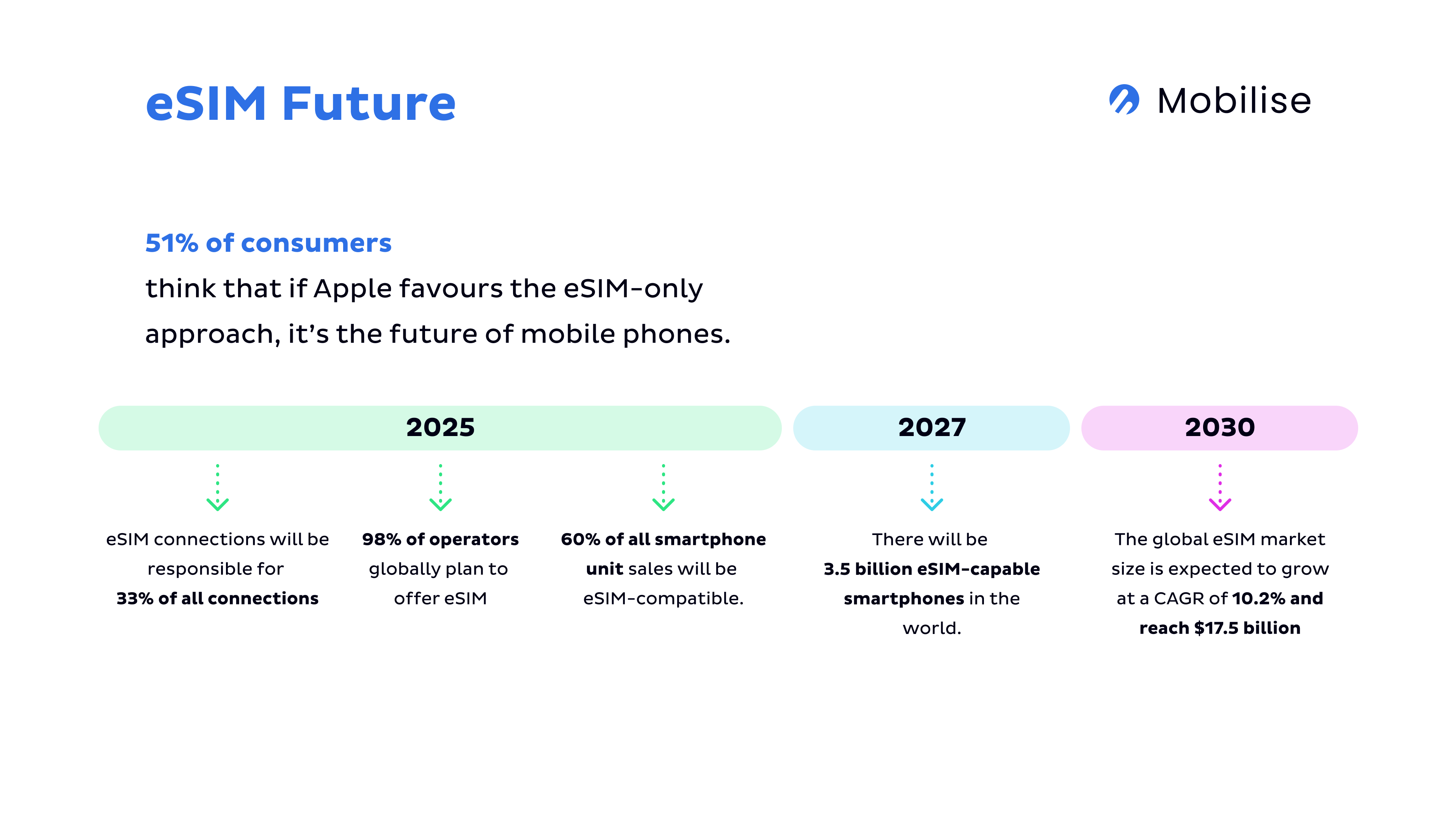
In the context of travel, a report from Kaleido Intelligence shows that thanks to eSIM aggregators, the travel SIM market is predicted to be worth around $10 billion by 2028. This emphasises the potential of eSIM for the travel sector to capitalise on. With a predicted 500% increase in spending on travel eSIMs.
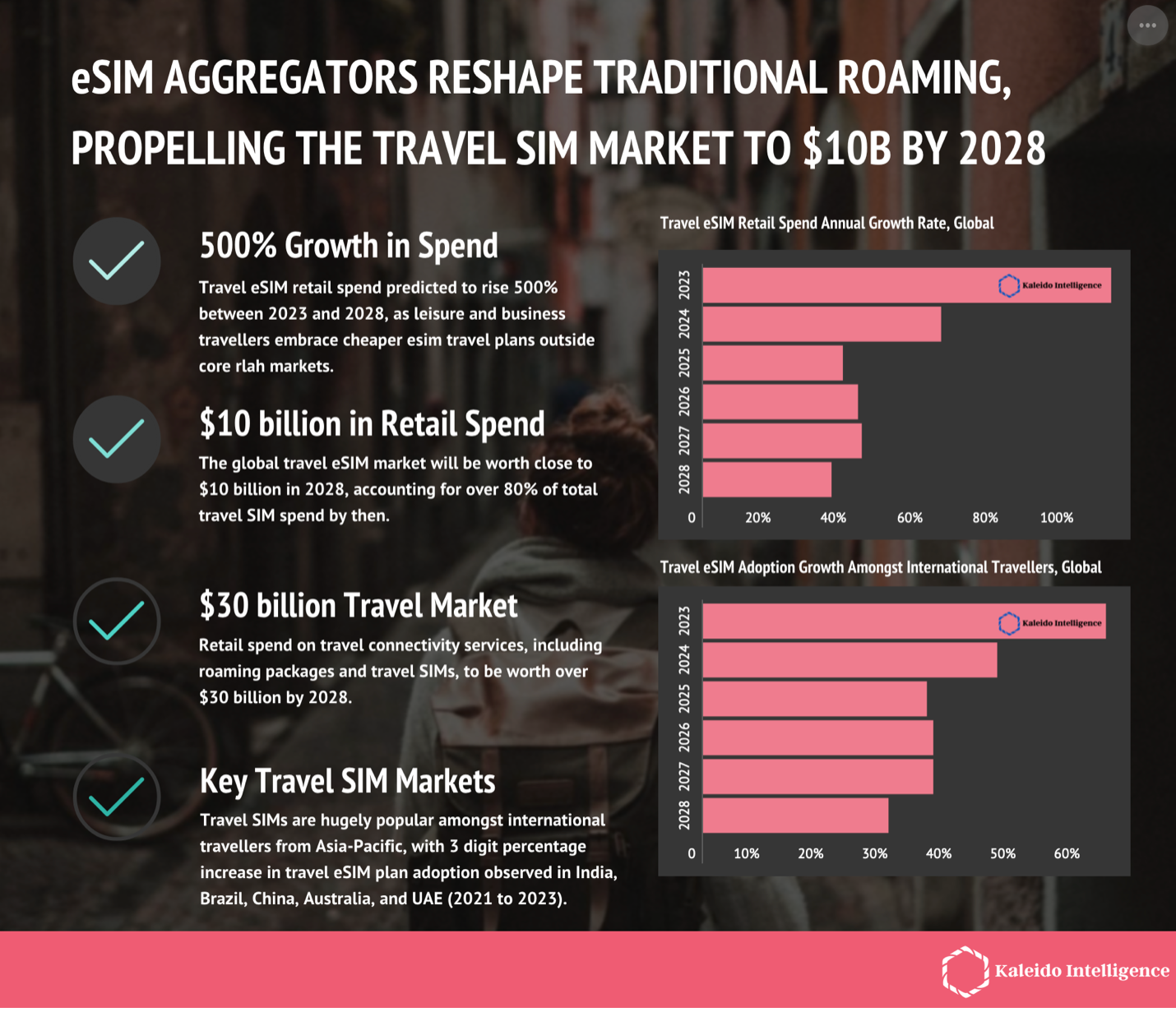
The use of eSIM is steadily growing. The technology will eventually eradicate physical SIMs and become the primary method of service authentication. It’s also anticipated, that due to its fully digital nature and multiple benefits, it’ll revolutionise several other industries.
Conclusion
Hotel Wi-Fi can be a great service for guests, but it often leaves users with less than desirable service. Hotels have the opportunity to benefit from and make use of eSIM to improve their services and customer experience.



